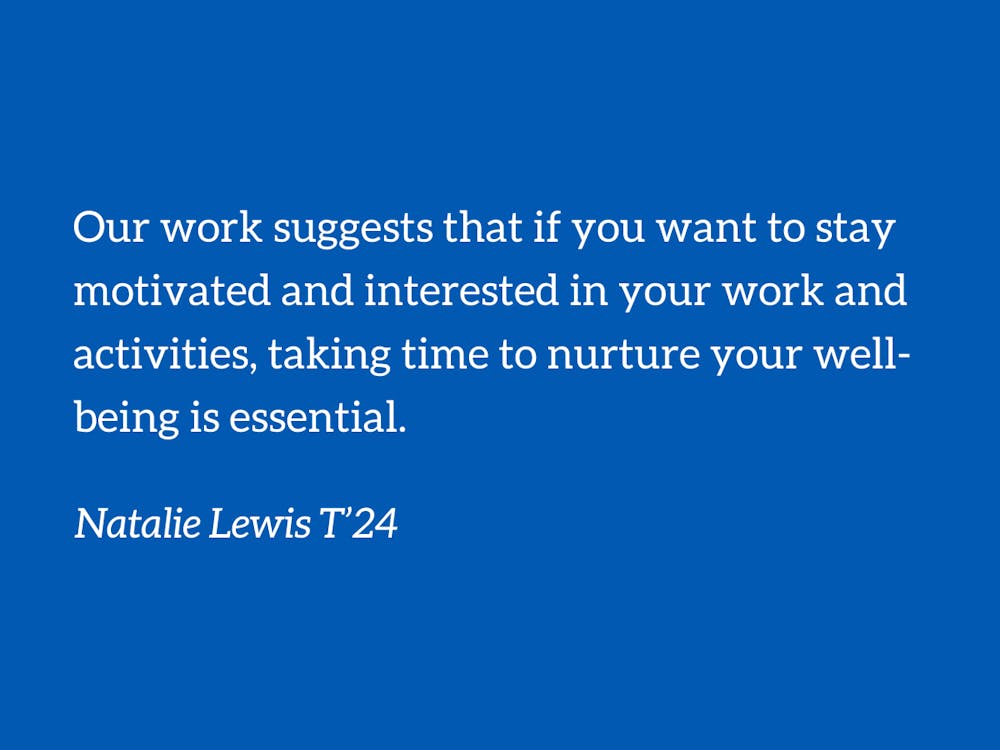At this point in the semester, you may be starting to feel your assignments and responsibilities piling up. As a recent Duke graduate of the Class of 2024, I remember constantly juggling weekly assignments alongside papers and exams, friends and extracurriculars. With so many responsibilities, it was challenging to find time to also do laundry, get enough sleep and reassure my family that I was surviving college. Sometimes, the never-ending to-do list became so overwhelming and exhausting that I struggled to get anything done. I wanted to make the most of my time at Duke, but my motivation hit an all-time low.
While studying mental health in my psychology and neuroscience classes, I discovered a name for what I was experiencing: burnout. Burnout is a mental health challenge that can result from prolonged exposure to stress and involves feelings of exhaustion and detachment from work.
I decided I wanted to understand the experience of college burnout and what, if anything, might prevent it. As part of my senior thesis that I completed under the guidance of Dr. Bridgette Hard in the psychology and neuroscience department, I surveyed students about their experiences with burnout, as well as ways that they nourished their physical and mental well-being through “self care.” Our participants were 370 introductory psychology students; 36 Duke students recruited through word of mouth, social media and fliers; and 299 college students recruited from an online research website.
Here is what we found.
1. Many students report feeling burnout.
Most undergraduate students in our study experienced at least some symptoms of burnout. Burnout can present in students as feelings of inadequacy, wondering whether schoolwork has meaning, sleeping poorly and ruminating over matters relating to school. If these symptoms sound familiar to you, our data suggests that you are not alone!
2. Engaging in more self-care predicted less burnout.
In our study, students reported using many different self-care strategies to restore their physical and mental health during times of stress. In general, students who prioritized self-care activities more frequently experienced less burnout. Our work suggests that if you want to stay motivated and interested in your work and activities, taking time to nurture your well-being is essential.
3. Certain self-care behaviors were particularly protective.
Although students use many forms of self-care, here were the forms of self-care that seemed to work best:
A. Nurturing relationships.
More than half of our participants preferred socializing with friends and family as a way to rest and recharge. Our study revealed that self-care behaviors that strengthen relationships are a strong protector against burnout. So keep planning study groups, get meals with friends and prioritize the people in your life that mean something to you! I would also suggest incorporating social interactions without substances into your routine because students who used drugs and alcohol as self-care actually reported higher levels of burnout.
B. Showing self-compassion.
We found lower levels of burnout in students who show themselves compassion, which means being kind and accepting of themselves and their emotions. You may feel the need to be hard on yourself when struggling academically, but our study suggests that positive self-talk and self-forgiveness are key to maintaining well-being and motivation. Next time your workload feels overwhelming, treat yourself the same way you would treat your best friend: listen to your body and allow yourself to process your emotions.
C. Staying organized.
Students who use organization as self care, including tidying their workspace and living environment or planning out their schedule, experience lower burnout. Sometimes, decluttering or using a planner to balance your time can reassure you that you have control over your responsibilities, promoting motivation and reducing disorganization that can otherwise amplify stress.
D. Making time for “brain breaks.”
Some students recharge by stepping away from work and engaging in a different, enjoyable activity. Taking time to exercise, listen to music, and watch entertaining videos predicts lower burnout. You don’t need me to tell you twice! Go to the gym, listen to that podcast or watch a little television as a relaxing brain break.
Investing in self-care can help you stay energized and motivated throughout the semester. Fostering relationships, being kind to yourself, organizing your space, and taking breaks are great ways to prevent burnout. But self-care is personal and you should find what works best for you! As you approach a difficult time of the semester, consider: What helps you feel restored and re-energized when life gets stressful and overwhelming? What are ways that you can be sure to recharge yourself in the weeks to come?
Natalie Lewis T’24 was a neuroscience major at Duke. Bridgette Hard is a Professor of the Practice in Psychology & Neuroscience at Duke and the Director of Undergraduate Studies for Psychology
Get The Chronicle straight to your inbox
Sign up for our weekly newsletter. Cancel at any time.

